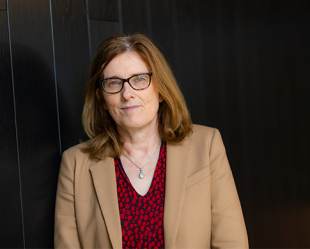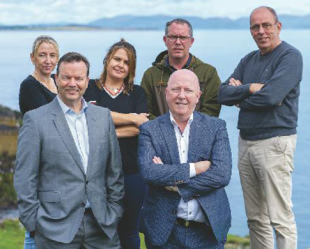This article, written by NSAI's Dr. Pamela Dagg, was originally published in the OIML Bulletin in April 2024.
Sustainability requires everyone to become involved and to play their part in providing a sustainable future for all.
Dr. Pamela Dagg Director of Legal Metrology
Sustainability is a term that is commonly used in our daily lives, but does anyone really know what it means or is it just another buzz word that everyone uses? Sustainability means simply living within our planet’s resources and re-using resources and materials so that our natural resources are not exhausted.
How do you or your organisation become sustainable is the question that everyone needs to answer. How does this impact the OIML and the wider metrology world? And how do we (as metrologists) play a pivotal role in helping organisations, communities, countries, and individuals to become sustainable so that future generations can continue to live and enjoy this beautiful planet that we all call home? We all have a role to play in achieving sustainability and as metrology professionals we play a crucial role in achieving this goal.
Accurate measurement is the fundamental requirement for all scientific data, and metrology provides the vessel for the accurate and reliable measurement of data. Metrology is an essential component for climate science, as metrology provides the data which climate scientists and governments use to establish baselines and to set targets to enable us as citizens, governments, or organisations to achieve our common goal of being a sustainable society.
Legal metrology ensures legal and accurate measurements enabling consumer, business, and economic confidence. Metrology plays a pivotal role throughout society, including:
-
supporting the local and global economy;
-
supporting innovation and technical development; and
-
assisting in protecting the environment.
Global economy role
Every day consumers, traders and industry make decisions which are based on measurement information and data. These measurements and assigned values can affect global economies and wealth. A well-functioning economy has confidence in these metrology measurements/data, which provide transparency for consumers, businesses, and regulators. These metrology functions range from scientific and industrial to legal, and are essential pillars of the quality infrastructure that, among other things:
-
help ensure fair trade;
-
provide consumer and business protection;
-
support and improve public safety;
-
support scientific and technological innovations;
-
support economies and government through revenue collection for tax and duties;
-
support business through fees for services, such as taxi metering;
-
support utility metering: water, gas, and electricity;
-
support the provision of accurate measurements and analytical results, etc. in the health sector;
-
drive resource control and protection of the environment; and
-
enable sustainable societies, organisations and countries.

Metrology plays a key role in global economies, as the value which is placed on our natural resources and commodities (such as gold, other precious metals, etc.) requires accurate quantification through measurement. It is acknowledged in the financial world that the environment and natural resources are valuable assets both for countries and organisations alike. These valuable assets have seen the introduction of corporate social responsibilities, natural capital reporting, in addition to sustainable development goals as a mechanism to promote sustainability and environmental protection.
Supporting innovation and technical development
The metrology system is a key resource for effective innovation and, more widely, for economic performance. Metrology, documentary standards and accreditation are all deeply embedded in the modes of innovation practice across industry and commerce and in the public sector. They are complementary to, and supportive of, the other drivers of innovation, such as new technologies, knowledge from the research base, organisational and managerial changes, and marketing strategies.
National Measurement Systems are part of, and directly support several types of innovation polices, and strategy and can have a distinct impact on productivity. The innovation and efficiency-promoting roles of the infrastructure contribute to economic growth and productivity as well as to international competitiveness. Results of the research in metrology science and technology can stimulate new product development in the scientific and precision instrument and equipment sector, which then ‘fans out’ into use in industry, raising productivity through improved process and quality control. Accurate measurement “standards” underpin the technical standards that help to spread new and improved technologies through businesses and support international trade.
Measurement data underpin a wide range of public goods and services, including consumer protection (legal metrology), forensic science, environmental controls, safe medical treatment and food safety regulation.
The metrology system is a key resource for effective innovation and, more widely, for economic performance.
Dr. Pamela Dagg Director of Legal Metrology
Protecting the environment
Monitoring the environment is a key factor for measuring our impact on the planet and assessing how sustainable a society we are. Metrology, through accurate reliable measurements, allows for the quantification of our planet resources and their depletion, which can then be used to assess our sustainability. Metrology provides the mechanism for performing accurate measurements which quantify the emissions of our activities on the planet, and which are critical for climate science and climate impacts. The importance of accurate measurement cannot be understated as it forms the basis of our climate baseline and sets the net zero targets for each country/organisation and in turn for each individual so we can protect our planet, future generations and ultimately our ability to survive on this planet. These metrological data assist climate scientists and governments in the formulation of climate action policies. These decisions made by governments which affect both the environment and how we live require the support of accurate traceable measurements. These policies and decisions can impact how we live, such as:
-
control of natural resources;
-
accurate assessment of environmental quality and indicators such as water, air and soil quality testing; and
-
transport.

How can the OIML assist?
The OIML plays an important role in assisting society, organisations and government in becoming sustainable. Innovation for sustainability has experienced rapid growth including the use of alternative sustainable fuels for domestic and commercial transport throughout our planet. The OIML has an important role to play in supporting national and international policies for a more sustainable, safer, and better future for everyone and our planet.
The OIML can lead, promote, and co-ordinate metrology organisations to develop safe and accurate universal measurement protocols for these alternative sustainable fuels. The OIML can also lead in the development and promotion of new and more sustainable measurement mechanisms to support government policies and industry which includes:
-
non-destructive testing where feasible, for example concerning packaged food goods, e.g. reduction in food waste and packaging waste;
-
carbon measurement (supporting net zero requirements and reducing green washing);
-
assisting in creating a circular economy by promoting the repair, reuse, recycling, and designing of more environmentally friendly and sustainable measuring meter and tests; and
-
placing a value on natural assets and not just products.
Sustainability requires everyone to become involved and to play their part in providing a sustainable future for all. Governments, industry, society, and individuals all play an important role in this, with measurement being a critical part of achieving sustainability as without accurate measurements, baselines cannot be relied upon or targets achieved.
The OIML and metrologists around the world will continue to provide confidence and assurance in measurements and provide consumers and businesses with confidence, while supporting national and international policy as we all strive to be a sustainable society.
To find out more about NSAI's Legal Metrology Service, please visit NSAI.ie/legal-metrology

Pictured: Dr. Pamela Dagg



